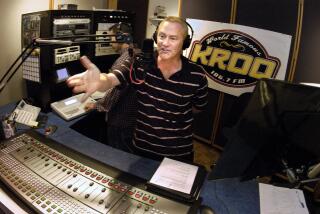THE SOUND OF SILENCE AT KHJ RADIO
KHJ-AM(930), the venerated home of âBoss Radioâ during the â60s and â70s, will disappear from the airwaves after today.
Beginning Saturday, KHJ listeners who switch to the middle of their AM dial will hear the same basic âSmokinâ Oldiesâ format it has been playing in recent weeks as well as some of the same deejays.
But the 5,000-watt RKO station, which has used the same call letters for more than 63 years, will be known henceforth as KRTH-AM, the weaker AM sister of KRTH-FM (101.3). Ron Thompson, KHJ general manager, will continue to manage KRTH-AM, but 23 employees of KRTH-AM and FM have been terminated along with the KHJ call letters.
âItâs the end of an era, man,â said 26-year-old KRTH deejay Rick Scott, one of those RKO employees given walking papers this week in the station shuffle. âHalf of Los Angeles grew up with Boss Radio.â
Since the late 1970s, KRTH-FM has overshadowed KHJ in the quarterly Arbitron listener ratings, clearly becoming the more popular and powerful of the two RKO-owned-and-operated radio stations in the Los Angeles market. A number of format experiments began with an abortive attempt to climb on the short-lived âUrban Cowboyâ bandwagon in 1981 with a switch to country music that lasted less than a year.
Its latest attempt to win listeners was a mix of frequent traffic reports and Top 40 music that the station called âCar Radio.â The format was designed to win over freeway drivers who wanted to know what traffic jams to avoid at the same time they wanted to hear the Pointer Sisters.
Car Radio never caught on, though, and has been phased out.
During its prime in the late 1960s and early 1970s, KHJ occupied the top position among Los Angeles radio stations, just as KIIS-FM (102.7) does today. Ironically, KIISâ top-rated morning deejay Rick Dees held his first Los Angeles job with KHJ during its brief attempt to return to a âBoss Radioâ format in 1982. He moved over to KIIS within a year where he has been given considerable credit for building that stationâs listenership to its present No. 1 position in the highly competitive Los Angeles market, where 85 stations vie for listeners.
KHJ made a similar attempt to return to its Boss days this fall when it hired veteran Los Angeles deejay Dave Hull to anchor the morning drive-time slot. The âHullabalooerâsâ antics with sound effects, one-liners and good-time patter failed to boost the KHJ ratings quickly enough to satisfy RKO Radio president Jerry Lyman, who formally announced the demise of the station on Thursday.
Boss Radio was the brainchild of Atlanta deejay Bill Drake who took over as program director at KHJ in 1965. In his definitive book on the history of radio and pop music, âMusic in the Airâ (Hastings House, 1982), Philip Eberly described the âDrake Formulaâ this way:
âStarting with the stationâs location, âBoss-Angeles,â everything was âBoss.â Bill Drake distilled the essence of Top 40:
--He declared dead air a felony;
--He decreed more rapid-fire talk by disc jockeys;
--He dropped the traditional 40-song play list down 10 to 30. (That is, âBoss 30â).
--He reduced the allowable 18 commercials per hour (the FCC quota) to an ironclad 12.â
Within a year, Los Angeles teen listeners responded so intensely to the Drake Formula that RKO began using it at its stations across the country, including KFRC-AM in San Francisco. Boss Radio alumni include the Real Don Steele, Robert W. Morgan and Machine Gun Kelly.
âBill Drake enforced time limits for deejay patter between records and other program elements,â Eberly wrote. âKHJâs claim that it played âmuch more musicâ could hardly be met, Drake felt, if disc jockey yakked on endlessly. From the enemy camp, where had risen such unflattering cries as âDreck Radio,â came word that Bill Drake had gone so far as to install a studio light to flash when a disc jockey, overcome with even a mild case of flux de bouche , chattered on beyond seven seconds. . . .â
Eberly cites the following statement as an example of Boss Radio babble. It was delivered by Don Steele (currently afternoon deejay on KRLA-AM) between records that he played on his afternoon KHJ show 15 years ago:
âThree oâclock in Boss Angelese! And gey, HEY, thitz me, the Real Don Steele, a billion dollar weekend there, and youâre looking out of sidewalk call. I got nothing but groovy those groovy golds. Weâre gonna fit Chuck out here on a fractious Friday boy, got to get a set outside that (unintelligible word resembling blowing bubbles in a glass of water) jumbo city. (Pause). Take a trip. When you chase âem, daylight!â
Steele delivered it all in 16 seconds.
Then he went to the next record.
More to Read
Sign up for Essential California
The most important California stories and recommendations in your inbox every morning.
You may occasionally receive promotional content from the Los Angeles Times.










